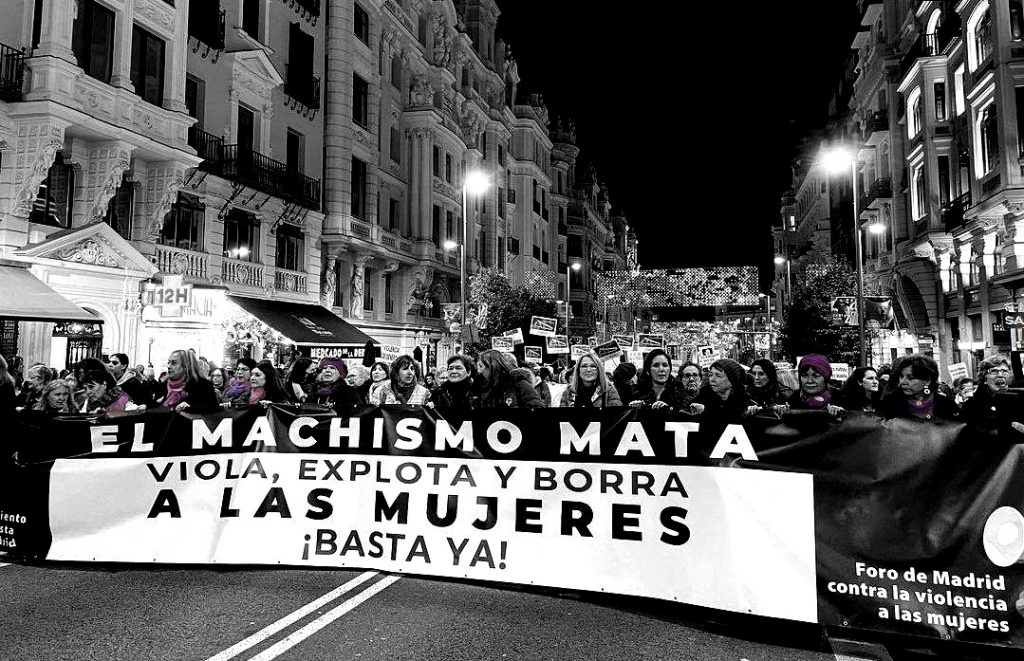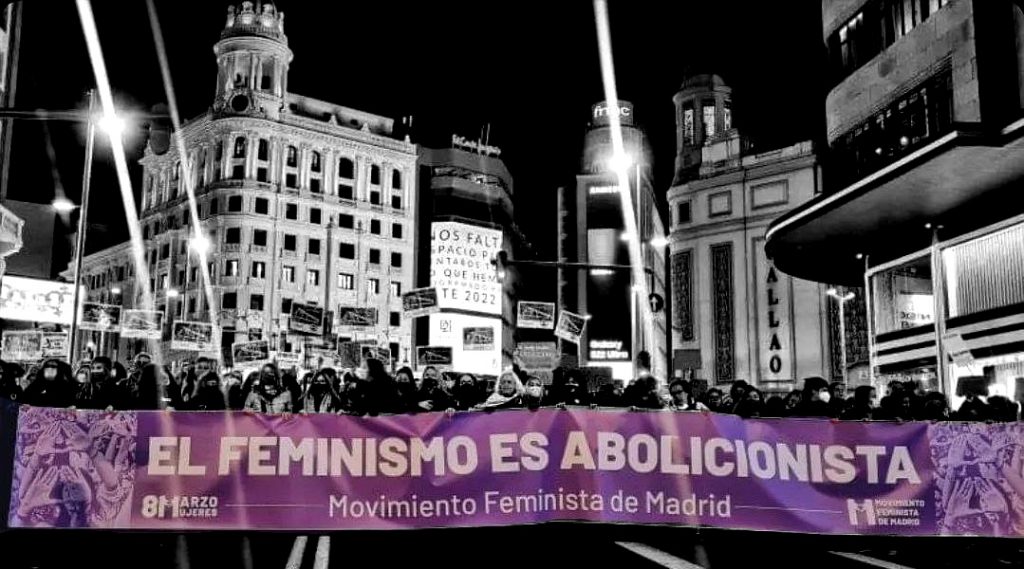
In Spanien wurde gerade das “ley trans” (Self-ID) verabschiedet. Wir stehen in diesem Kampf auch an der Seite unserer spanischen Schwestern, wir werden in Madrid zum internationalen Frauentag dabei sein.
In Spanien wurde vor kurzem das “ley trans” (Selbst-ID) verabschiedet. Auch wir stehen in diesem Kampf an der Seite unserer spanischen Schwestern, wir werden in Madrid zum Internationalen Frauentag dabei sein.
Wie entstand die Movimiento Feminista de Madrid (Feministische Bewegung von Madrid)?
Das Movimiento Feminista de Madrid ist ein Zusammenschluss verschiedener Frauenkollektive (auf staatlicher, gesellschaftlicher oder kommunaler Ebene), die sich zusammengeschlossen haben, um eine Demonstration für den 8. März in Madrid zu organisieren, die unabhängig von der vom Gleichstellungsministerium organisierten Demonstration ist und sich gegen die “feministische Politik” richtet, die uns beinträchtigt und belastet.
In den vorangegangenen Jahren wurde der für die Frauenrechte eintretende Charakter des 8. März verwässert und Forderungen aufgenommen, die der Feministischen Agenda zuwiderliefen (Legalisierung der Prostitution, Hypersexualisierung, “Feminismus bedeutet, für alle zu sorgen”), der Wendepunkt war jedoch die Absicht des Gleichstellungsministeriums, das so genannte “Trans-Gesetz” (“Ley trans”) zu verabschieden, das es jedem Mann erlauben würde, ohne weitere Voraussetzungen als seinen Willen, sein Geschlecht im Melderegister zu ändern, wodurch jede vergangene, gegenwärtige oder zukünftige Politik, die darauf abzielte, Frauen in den Situationen zu schützen oder zu unterstützen, die sie aufgrund ihres Geschlechts betreffen könnten, inhaltslos wurde. Dies veranlasste die Feministinnen von Madrid, unterstützt von Feministinnen aus ganz Spanien, den Schritt zu wagen, unabhängig von den Institutionen zu sein und einen eigenen feministischen Marsch zu organisieren, der sich unter dem Namen Movimiento Feminista de Madrid (Feministische Bewegung von Madrid) zusammenschloss.
Für welche politischen Aktionen setzt ihr euch ein?
Zurzeit engagieren wir uns hauptsächlich für zwei große Veranstaltungen im Jahr: Den 8. März und den 25. November. Andererseits führt jede der Gruppierungen ihre eigenen Aktionen durch, die im Allgemeinen von der MFM als Kollektiv unterstützt werden. Eine der assoziierten Plattformen hält zum Beispiel am 25. eines jeden Monats Kundgebungen an der Puerta del Sol ab, um gegen Feminizide zu protestieren. Ein anderer Verband hat sich um die Änderungsanträge zum “Trans-Gesetz” gekümmert und sie an den Kongress geschickt. Da wir sehr unterschiedliche Organisationen sind, führen wir im Allgemeinen das ganze Jahr über kleine Aktionen in verschiedenen Bereichen durch.
Welche Aktionen sind für den 8. März geplant?
Zusätzlich zur Demonstration der Abolitionistinnen am 8. März bereiten wir am Sonntag, den 5. März, eine Kundgebung vor, die jedes Jahr auf dem Platz stattfindet, der an die spanische Abolitionistin und Suffragette Clara Campoamor erinnert, die zum ersten Mal das Frauenwahlrecht in Spanien durchsetzte. Zusätzlich zu Outreach-Aktionen in den sozialen Netzwerken, sowohl auf Instagram als auch auf Facebook und Twitter, und anderen kleinen Aktionen wie dem Kleben von Plakaten, Workshops zum gemeinsamen Gestalten von Plakaten, die zur Demonstration mitgenommen werden, eine Aktion zum Gedenken an die Opfer von Feminiziden, bei der ein Baum zu ihren Ehren gepflanzt wird. Und andere Aktionen, die von den verschiedenen Organisationen durchgeführt und von der Plattform unterstützt werden.
Wie wirkt sich die Verabschiedung des “Trans-Gesetzes” auf die spanische feministische Bewegung aus und wie wirkt es sich auf die MFM aus?
Die Verabschiedung des “Trans-Gesetzes” ist ein Problem für alle Frauen in Spanien und für Menschen, die von Gender-Dysphorie betroffen sind. Es ist ein Gesetz, das die Wünsche Einzelner (vor allem der Männer) über das Gemeinwohl der Frauen und ihre Sicherheit stellen will. Außerdem werden Kinder und Jugendliche, die an einer “Dysmorphophobie” oder ” Dysphorie” leiden, ohne die ihnen zustehende psychologische Behandlung zurückgelassen und dazu verurteilt, für den Rest ihres Lebens unter den Folgen einer Entscheidung zu leiden, die sie in ihrer Kindheit oder Jugend auf der Grundlage von Halbwahrheiten oder Lügen getroffen haben, ohne dass irgendjemand in der Lage ist, ihrer Version zu widersprechen, denn alles andere als eine Affirmierungstherapie ( z.B.die Möglichkeit, dass der oder die Minderjährige nicht trans ist) ist keine gute Sache.
Das Gesetz zielt darauf ab, den feministischen Diskurs zu zensieren, so dass verschiedene Verbände und/oder die MFM selbst von juristischen Zensurversuchen betroffen sein könnten. Es liegt auf der Hand, dass es sowohl für einzelne Frauen als auch für Organisationen zahlreiche rechtliche Konsequenzen geben wird: Verlust von öffentlichen Zuschüssen, Schließung von Vereinigungen, weil ihre Ziele für illegal erklärt werden, Ausschluss von Fachfrauen in verschiedenen Sektoren und sogar schwere administrative Strafen. Wir können nicht versichern, dass die Verabschiedung dieses Gesetzes keine Auswirkungen auf uns haben wird, aber wir können versichern, dass es uns nicht zum Schweigen bringen wird.
Wir müssen jedoch berücksichtigen, dass es in Spanien bereits mehrere “Trans-Gesetze” in den verschiedenen Autonomen Gemeinschaften gibt. Es geht also nicht nur darum, das landesweite “Trans-Gesetz” zu verhindern, sondern auch darum, die Regelungen dieser Art aufzuheben, die im Laufe der Jahre in verschiedenen Regionen von der Hand verschiedener politischer Parteien verabschiedet wurden und die bereits jetzt die Verbände und Fachfrauen beeinträchtigen. Es muss klar sein, dass dieses Landesgesetz nur dazu dient, den bereits in Kraft befindlichen Regelungsrahmen zu verstärken. In Spanien gibt es außerdem bereits seit 2007 eine Regelung, die die Änderung des Geschlechts von “Trans-Menschen” unter einer Reihe von Bedingungen mit Hormonen regelt.
Wie seht ihr die Zukunft feministischer Aktionen angesichts der Tatsache, dass die feministische Agenda in gewisser Weise als “illegal” angesehen werden könnte?
Nun, ich kann versichern, dass weder dieses noch irgendein anderes Gesetz die Feministische Agenda und die Verteidigung der Frauenrechte zensieren wird. In Spanien haben die Frauen bereits während der Diktatur eine Zeit der totalen Zensur erlebt und verschiedene Wege gefunden, sich auszudrücken, indem sie die Zensur umgingen. Wir alle wissen, dass die Umgehung der Zensur eine Kunst ist, und wir müssen uns vor Augen halten, dass das Recht auf freie Meinungsäußerung (ein in unserer Verfassung verankertes Recht) für alle Äußerungen gilt. Wir müssen in unserer Sprache “origineller” und vorsichtiger sein, ja, aber kein Gesetz wird uns zum Schweigen bringen oder uns dazu bringen, den Kampf für unsere Rechte aufzugeben. Es gibt Frauen, die uns brauchen, um ihre Stimme zu sein, die unsere Hilfe brauchen und die uns kämpfen sehen müssen. Der Feminismus ist, war und wird standhaft bleiben, der Feminismus ist stark in allen Widrigkeiten.
Zählt ihr auf internationale Unterstützung für den 8. März? Ist die internationale Zusammenarbeit für euren Verband wichtig?
Natürlich wissen wir, dass wir auf Abolitionistinnen und Kämpferinnen aus der ganzen Welt zählen können, und für uns ist ihre Unterstützung unerlässlich. Ihre Unterstützung auf der Straße, sowohl in ihren Ländern als auch indem sie zur Teilnahme am Abolitionistischen Marsch am 8. März in Madrid ermutigen. Eure Unterstützung in den sozialen Netzwerken, beim Aktivismus und im Alltag. Wir wissen, dass wir nicht allein sind und wie wichtig es ist, dass Feministinnen auf der ganzen Welt zusammenhalten. Feminismus ist ein Internationalismus, patriarchale Unterdrückung betrifft uns alle, von Asien bis Amerika, über Afrika und Ozeanien. In Spanien haben wir einen feministischen Spruch: “Von Nord bis Süd, von Ost bis West, der Kampf geht weiter, egal was es kostet.“ Und das ist es, was uns anspornt, weiterzumachen: der Kampf für die Rechte aller Frauen auf der ganzen Welt und das Wissen, dass Feministinnen überall das Gleiche für uns tun werden. Und natürlich heißt die Movimiento Feminista de Madrid Frauen aus der ganzen Welt willkommen.
ENG
In Spain, the “ley trans” (Self-ID) has just been passed. We also stand with our Spanish sisters in this struggle, we will be there in Madrid for International Women’s Day.
How did the Feminist Movement of Madrid come about?
The Feminist Movement of Madrid is a grouping of different women’s collectives (state, community or municipal) that joined together to organize a demonstration for the Abolitionist March 8th in Madrid independent of the one organized by the Ministry of Equality, contrary to the feminist policies that affect and occupy us.
During the previous years, the 8th of March had diluted its vindicative character of women’s rights and incorporated demands contrary to the Feminist Agenda ( legalization of prostitution, hypersexualization, “feminism means caring for everybody” ), however, the breaking point was the intention of the Ministry of Equality to approve the so-called “Trans Law” (“Ley trans”) that would allow any man, with no other requirement than his will, to change his sex in the civil registry, thus emptying of content any past, present or future policy that sought to protect or support women in those situations that could affect them because of their sex. This made the Madrid feminists, supported by feminists from all over Spain, decide to take the step of being independent from the institutions and organize our own feminist march, grouped under the name of Movimiento Feminista de Madrid (Madrid Feminist Movement).
What political actions do you dedicate yourselves to?
Currently, we are mainly dedicated to two major events throughout the year: March 8th and November 25th. On the other hand, each of the groupings carries out its own actions that are generally supported by the MFM as a collective. One of the associated platforms, for example, holds rallies at Puerta del Sol on the 25th of each month to protest against feminicides. Another of the associations has been in charge of processing the amendments to the “trans law” and has sent them to Congress. As we are very diverse organizations, in general we carry out small actions throughout the year in different areas.
What actions are planned for 8M?
In addition to the Abolitionist Demonstration on March 8, we are preparing, a concentration that takes place every year in the square that commemorates the Spanish abolitionist Suffragette Clara Campoamor who achieved for the first time women’s suffrage in Spain this will take place on Sunday, March 5. In addition to outreach actions on social networks, both Instagram and Facebook and Twitter and other small actions such as sticking posters, workshops to make posters together to take to the demonstration, an action to remember the victims of feminicide by planting a tree in their honor. And other actions to be carried out by the different organizations and supported by the platform.
How does the approval of the “Trans Law” impact the Spanish Feminist movement and how does it impact the MFM?
The approval of the “Trans Law” will be a problem for all women in Spain, as well as for people affected by gender dysphoria. It is a law that seeks to put the desires of individuals (especially males) before the common good of women and their safety. It will also leave children and adolescents suffering from a “dysmorphia” or “dysphoria” disorder without the psychological treatment they deserve and condemns them to suffer for the rest of their lives the consequences of a decision made in childhood or adolescence based on half-truths or lies, without anyone being able to contradict their version, for anything other than affirmative therapy (not being able to raise the option that the minor is not trans) is not a good thing.
The law seeks to censor feminist discourse, so various associations and/or the MFM itself could suffer legal attempts at censorship. It is clear that there will be multiple legal consequences, both for individual women and for organizations: loss of public aid, closure of associations because their purposes are declared illegal, disqualification of professional women in different sectors and even heavy administrative penalties. We cannot affirm that the approval of this regulation will not affect us, but we can affirm that it will not silence us.
However, we must take into account that in Spain there are already several “Trans Laws” in the different Autonomous Communities, so the objective is not only to avoid the state “Trans Law” but to repeal the rules of this type that have been approved over the years in different regions by the hand of various political parties and that are already affecting associations and professional women. It must be understood that this state law is only intended to shore up the regulatory framework already in force. In Spain, moreover, since 2007 there is already a norm that regulates the change of sex of “trans people” under a series of hormone conditions.
How do you see the future of feminist actions given that, in a way, the feminist agenda could be seen as “illegal”?
Well, I can affirm that neither that nor any law will censor the Feminist Agenda and the defense of women’s rights. In Spain, women already lived through a time of total censorship during the dictatorship and found different ways to express themselves by circumventing such censorship. We all know that bypassing censorship is an art and we must keep in mind that freedom of expression (a right enshrined in our Constitution) applies to all speeches. We will have to be more “original” and cautious in our speech, yes, but no law will silence us or make us abandon the fight for our rights. There are women who need us to be their voice, who need our help, who need to see us fight. Feminism is, was and will be resilient, feminism is strong in adversity.
Do you count on international support for the 8M? Is international collaboration important for your association?
Of course we know that we can count on women abolitionists and fighters from all over the world and for us their support is essential. Their support in the streets both in their countries and by encouraging them to come to the March 8 Abolitionist March in Madrid. Your support in networks, in activism, in the day to day. We know that we are not alone and we know how important it is that feminists around the world stay united. feminism is an internationalism, patriarchal oppression affects us all, from Asia to America, through Africa and Oceania. in Spain we have a feminist cry: From north to south, from east to west, the fight goes on, whatever it takes. And that is what inspires us to keep going, the fight for the rights of all women around the world, and the knowledge that feminists everywhere will do the same for us. And of course, the Madrid Feminist Movement welcomes women from anywhere in the world to attend.
ESP
En España se acaba de aprobar la ley trans. También estamos junto a nuestras hermanas españolas en esta lucha, estaremos allí en Madrid para el Día Internacional de la Mujer.
–¿Cómo se forma el Movimiento Feminista de Madrid?
El Movimiento Feminista de Madrid es una agrupación de diferentes colectivos de mujeres (estatales, comunitarias o municipales) que se unieron para organizar una manifestación para el 8 de Marzo Abolicionista en Madrid independiente de la organizada por parte del Ministerio de Igualdad, contrario a las políticas feministas que nos afectan y ocupan.
Durante los años anteriores, el 8 de Marzo había diluyendo su carácter reivindicativo de los derechos de las mujeres e incorporando reivindicaciones contrarias a la Agenda Feminista (legalización de a prostitución, hipersexualización, “el feminismo es cuidar”…), sin embargo, el punto de quiebre fue la intención por parte del Ministerio de Igualdad de aprobar la llamada “Ley Trans” que permitiría a cualquier varón, sin más requisito que su voluntad, cambiar su sexo en el registro civil, vaciando esto de contenido cualquier política pasada, presente o futura que pretendiera proteger o apoyar a las mujeres en aquellas situaciones que las pudieran afectar por razón de sexo. Esto hizo que las feministas madrileñas, apoyadas por feministas de toda España nos decidiéramos a dar el paso de ser independientes de las instituciones y organizar nuestra propia marcha feminista, agrupadas bajo el nombre de Movimiento Feminista de Madrid.
– ¿A qué acciones políticas se dedican?
Actualmente, nos dedicamos principalmente a dos grandes eventos a lo largo del año: el 8 de marzo y el 25 de Noviembre. Por otro lado, cada una de las agrupaciones lleva a cabo sus propias acciones que generalmente son apoyadas por el MFM como colectivo. Una de las plataformas asociadas por ejemplo, realiza concentraciones en la Puerta del Sol el 25 de cada mes para protestar contra los feminicidios. Otra de las asociaciones, se ha encargado de tramitar las enmiendas a la “ley trans” y las ha hecho llegar al Congreso. Cómo somos organizaciones muy diversas en general se realizan pequeñas acciones a lo largo de todo el año en diferentes ámbitos.
– ¿Qué acciones están previstas para el 8M?
Además de la Manifestación Abolicionista del día 8 de Marzo, estamos preparando, una concentración que se lleva a cabo cada año en la plaza que conmemora a la Sufragista Abolicionista española Clara Campoamor que consiguió por primera vez el sufragio femenino en España esto tendrá lugar el domingo 5 de Marzo. Además de acciones de divulgación en redes sociales, tanto Instagram como Facebook y Twitter y otras pequeñas acciones como pega de carteles, talleres para realizar juntas carteles para llevar a la manifestación, una acción para recordar a las víctimas de feminicidios plantando un árbol en su honor. Y otras acciones que llevaran a cabo las diferentes organizaciones y que se apoyaran por parte de la plataforma
-¿Cómo impacta la aprobación de la “Ley Trans” al movimiento Feminista Español y como impacta esto al MFM?
La aprobación de la “Ley Trans” será un problema para todas las mujeres de España, así como para las personas afectadas por disforia de género. Se trata de una ley que busca anteponer los deseos de personas individuales (sobre todo varones) al bien común de las mujeres y a su seguridad. Dejará también a la infancia y adolescencia que sufre de algún trastorno de dismorfia o disforia sin el tratamiento psicológico que merecen y les condena a sufrir por el resto de sus vidas las consecuencias de una decisión tomada en la infancia o adolescencia basada en verdades a medias o mentiras, sin que aún nadie pudiera contradecir su versión, pues cualquier cosa que no sea una terapia afirmativa (no poder plantear la opción de que ese menor no es trans).
La ley busca censurar el discurso feminista, asi que diversas asociaciones y/o el propio MFM podrían sufrir intentos legales de censura. Es evidente que habrá múltiples consecuencias legales, tanto para las mujeres de manera individual como para las organizaciones: pérdida de ayudas públicas, cierre de asociaciones por ser declarados sus fines ilegales, inhabilitación de mujeres profesionales en diferentes sectores e incluso penas administrativas cuantiosas. No podemos afirmar que la aprobación de esa norma no nos vaya a afectar, pero si podemos afirmar que no nos va a callar.
Sin embargo, debemos tener en cuenta, que en España ya hay diversas “Leyes Trans” en las diferentes Comunidades Autónomas, por lo que el objetivo no es solo evitar la “ley Trans” estatal sino derogar las normas de este tipo que se han ido aprobando a lo largo de los años en las diferentes regiones de la mano de diversos partídos políticos y que ya estan afectando a asociaciones y mujeres profesionales. Hay que entender, que esta Ley estatal, solo pretende apuntalar el marco normativo ya vigente. En España, además, desde el 2007 ya existe una norma que regula el cambio de sexo de las personas trans bajo una serie de condiciones de hormonación.
-¿Cómo ven las acciones feministas futuras dado que, de cierta forma, la agenda feminista podría verse como ilegal?
Bueno, puedo afirmar que ni esa ni ninguna ley va a censurar la Agenda Feminista y la defensa de los derechos de las mujeres. En España, las mujeres ya vivieron una época de censura total durante la dictadura y encontraron diferentes formas de expresarse sorteando dicha censura. Todas sabemos que saltarse la censura es todo un arte y debemos tener en cuenta que la libertad de expresión (derecho recogido en nuestra Constitución) se aplica a todos los discursos. Deberemos ser más “originales” y precavidas en nuestro discurso, si, pero ninguna ley nos callará o nos hará abandonar la lucha por nuestros derechos. Hay mujeres que necesitan que seamos su voz, que necesitan nuestra ayuda, que necesitan vernos luchar. El feminismo es, fue y será resiliente, el feminismo se hace fuerte en la adversidad.
– ¿Cuentan con apoyo Internacional para el 8M? ¿Es importante para su asociación la colaboración internacional?
Por supuesto que sabemos que podemos contar con mujeres abolicionistas y luchadoras de todo el mundo y para nosotras es imprescindible su apoyo. Su apoyo en las calles tanto en sus países como animandose a acudir al 8 de Marzo Abolicionista de Madrid. Su apoyo en redes, en el activismo, en el día a día. Sabemos que no estamos solas y sabemos lo importante que es que las feministas de todo el mundo nos mantengamos unidas. el feminismo es un internacionalismo, la opresión patriarcal nos afecta a todas, desde Asia hasta américa, pasando por África y Oceanía. en España tenemos un grito feminista: De norte a sur, de este a oeste, la lucha sigue, cueste lo que cueste. Y eso es lo que nos inspira a seguir adelante, la lucha por los derechos de todas las mujeres en todo el mundo, y el conocimiento de que las feministas de todo el mundo harán lo mismo por nosotras. Y por supuesto, el Movimiento Feminista de Madrid da la bienvenida a mujeres de cualquier lugar del mundo que quieran acudir.
Info:
8M Madrid
In Spanien wurde gerade das "ley trans" (Self-ID) verabschiedet. Wir stehen in diesem Kampf auch an der Seite unserer spanischen Schwestern, wir werden in Madrid zum internationalen Frauentag dabei sein.
•#FeministasEnLucha #8MarzoAbolicionista #NosotrasLasMujeres@MovFemMad https://t.co/CHkidkHMkl pic.twitter.com/uwra1liouX— RadFem_Berlin (@BerlinRadfem) February 16, 2023
¡📢Nosotras te acompañamos al #8MarzoAbolicionista‼️
¿Vas sola o en grupo pero sin ninguna organización? ¿No eres de Madrid pero vas a venir a la mani?
📍Podemos acompañarte, acude a la salida del Metro Estación del Arte, 🕕a las 18:00h. pic.twitter.com/QNuc3QgDtn— Movimiento Feminista de Madrid (@MovFemMad) March 1, 2023


